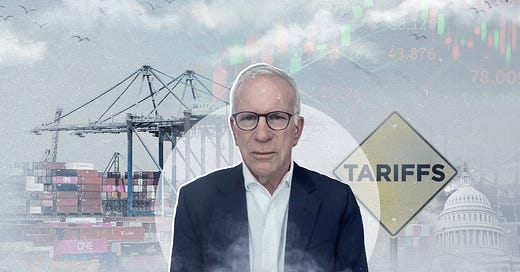The War Did Not Break the Markets...Yet
As Israel’s campaign against Iran unfolds, Ambassador James Glassman sees a geopolitical shock with unexpected economic potential. In a wide-ranging interview, the former Under Secretary of State for Public Diplomacy and seasoned financial commentator offered a grounded assessment of how this war could reshape energy markets, defense innovation, and postwar recovery.
“I am surprised that Israel went ahead without direct support from the United States,” Glassman said. “But the way things are unfolding, the U.S. administration is using the apparent success of the Israelis to push for the kind of deal that the Trump administration wanted in the first place.”
Glassman suggested that the confrontation may strengthen diplomatic leverage to contain Iran’s nuclear ambitions. “There's a good chance that we could get the policy objective, which is to end the Iranian program to develop a nuclear weapon,” he said.
Oil Markets
Glassman downplayed fears of an energy shock. “The United States is not going to allow a closure of the Straits of Hormuz. That would bring the U.S. into this war. There’s no doubt about that.”
He pointed to major structural changes in global energy production. “Iran is three percent of total oil production in the world. So it’s important, but it’s not all that critical,” he said. “We now have the United States as a major factor, which we did not have during the 1970s oil embargo.”
Thanks to advances in drilling and relaxed restrictions on federal lands, he sees oil markets better positioned to absorb shocks. “Right now, the U.S. is the number one producer of oil in the world,” he said. “Last time I looked, we were at $72 a barrel. Oil needs to be at a level that’s high enough so producers continue to drill — $65 to $75, maybe $80.”
Glassman also offered a counterfactual: “Even 20 years ago, if there had been a war in Russia and then one in Iran, that would’ve spiked oil prices to over $100 a barrel. Today, prices have gone up but come back down. There’s no panic.”
The Next War
If oil no longer defines the region, technology might. Glassman argued that drone warfare, AI, and asymmetric tools have transformed modern combat.
“Huge advances in technology warfare. Huge. There's a revolution,” he said.
He cited lessons from Ukraine and Israel in drone warfare, emphasizing both offensive innovation and defensive adaptation. “More and more drones are being used. But it's not just that — defensively, new systems are being thrown up. Now drones are attached to very thin filaments. The defense can't block them by jamming signals because it's by wire.”
This rapid evolution highlights a broader transformation: “You no longer need vast amounts of money to build defense. Cheap asymmetric tools can counter extremely expensive systems.”
Glassman also pointed to the shifting naval equation: “In a world in which missiles are so important, naval ships are very vulnerable. Aircraft carriers—those expensive weapons—are now much more at risk.”
Private Sector Innovation, Public Stakes
Glassman credited much of this shift to private enterprise. “These companies have to be a tool of the government... but absolutely, these private sector companies — in Israel, the U.S., and Europe — are developing very innovative weapons.”
He noted that even China, despite its centralized governance, empowers private firms to lead on drone development. “The Chinese government sets priorities, but then steps away. Thousands of drones in China deliver lunch orders daily. That’s a good model.”
Rules, Norms, and Tariffs
Beyond the battlefield, Glassman warned that the erosion of global norms is as dangerous as any missile. “We’ve had accepted norms since the end of World War II. And now they’re being violated in extreme ways.”
He criticized recent U.S. tariff policy as disruptive. “The president wants to impose tariffs of 20 or 25%. If we do that, there will be a massive trade war. Countries will respond. It would be terrible for the world economy.”
Glassman connected these shifts to broader instability. “Throughout history, serious economic downturns incite geopolitical turmoil. It’s no accident that World War II started on the heels of the Great Depression.”
From War to Recovery?
Asked about the Iranian regime, he said: “There's a greater chance of the regime falling than ever in the last 50 years. That could lead to turmoil. But there's also potential for real prosperity in Iran — if things change.”
Glassman believes postwar recovery is possible — but not guaranteed. “Frequently after this kind of explosion, we have a period of relative calm or peace.”
Gaza is another area Glassman kept returning to. He called on U.S. and Arab policymakers to seize the moment. “This is a really good opportunity. It's going to require Israeli cooperation, but the timing is very good.”
His message to Gulf leaders was clear: lead.
“I would really like to see the Arab countries contribute to the solution in Gaza,” he said. “That would mean the Israelis would have to agree and feel secure, but if [Arab states] move into a leadership position, that would be very, very beneficial.”
He said the solution must combine both security and economic support. “The answer is economic stability and growth for the Palestinian people. I do believe that part of the Middle East could be thriving. But it does require a real effort. And I think that effort is going to have to come from the Arab countries.”
Glassman pointed to improvements in Arab economies since his time in government. “They are in a much better position than they were 10 or 15 years ago. Their economies have diversified. They have good leadership. They understand markets. They could do this.”





